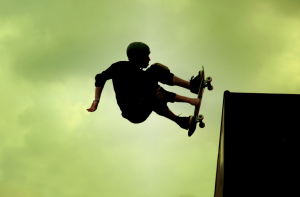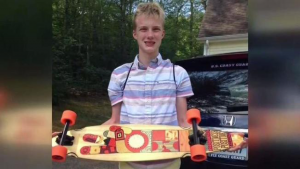
On November 25, 2016, 14-year-old Conor Irwin was skateboarding with friends. When his board skidded on some leaves, he lost control and fell to the ground. Conor hit his head on the pavement and was knocked unconscious.
He wasn’t wearing a helmet.
Conor suffered a traumatic brain injury (TBI) after striking his head. He was diagnosed with irreparable injuries including a skull fracture and brain bruising. As a result, Conor later died from his injuries.
The boy’s mother asked his neurosurgeon if a helmet could have saved his life. The doctor simply nodded in agreement. With that, Conor's family worked to create a law requiring kids to wear helmets while skateboarding.
Conor’s Bill
Conor’s mother admitted that because there was no law requiring kids to ride helmets while skateboarding, she didn’t realize how important they really were.

Helmets are especially important for children with developing brains. Yet young riders often travel unprotected.
The Irwin family campaigned for a new law aimed at protecting minors on skateboards. With members of the legislature's Transportation Committee, they developed Bill SB-290, or Conor’s Bill. This law would “require children fifteen years of age or under to wear protective headgear while skateboarding, roller skating or in-line skating.”
The new skateboarding helmet law is on the docket for approval at the end of 2018.
TBI and Skateboarding
Traumatic brain injuries can result in permanent behavioral and cognitive problems. Memory loss, lack of concentration, sleep disorders, disability and death are not uncommon. Even mild traumatic brain injuries can result in serious after effects.
The stats (2022):
- Over 200,000 people were admitted to the ER with skateboarding injuries.
- Out of those injured, most suffered head injuries. These children were likely riding without helmets.
Following a TBI, victims often suffer from temporary loss of consciousness. The resulting effects can be mild to disastrous. Serious TBI results in coma, respiratory problems and damaged motor functions. Since the brain influences behavior, a TBI can cause personality changes. Even after the recovery period, normal and daily activities may still be challenging.
A helmet helps protect your skateboarder from a lifetime of injury.
Finding the Right Helmet

Without the right helmet and proper fit, a rider can become as injured as if riding unprotected.
The Consumer Product Safety Committee (CPSC) provides a practical guideline on helmet safety. To ensure adequate safety, make sure you consider the following:
- Get the right helmet for the activity.
- Get the right fit for your child.
- Check the label CPSC approval.
Helmets protect the brain by absorbing impact during an event like a fall or collision. Wearing a helmet reduces the risk of serious brain injury or death following a blow to the head.
How You Can Help Prevent Child Skateboarding Injury
If your child is a skateboarder in Connecticut, prepare for Conor’s Bill to pass. Instruct your child to start wearing a helmet now and be consistent with this safety rule. Help your child understand that wearing a helmet is not an option. And set a good example by always wearing one yourself.
The Flood Law Firm believes that preventing injury is key to continued well-being. Show your support for the skateboarding helmet law by contacting your local legislator and ask them to vote yes on Conor’s Bill. Phone calls and letters from supporters can truly make a difference to child safety.
